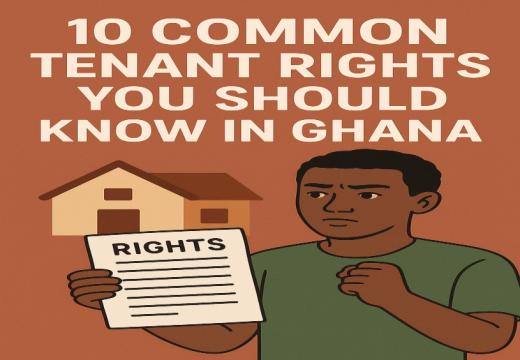10 Common Tenant Rights You Should Know in Ghana
10 Common Tenant Rights You Should Know in Ghana
- by PropHunt Admin
- On 20-05-2025
- at 11:14 AM

Renting a home in Ghana comes with tenants’ rights and responsibilities as well as landlord rights and obligations. Knowing them is key to maintaining a positive tenant agreement in Ghana. Whether you’re renting in Accra, Kumasi, or Tamale, tenant laws in Ghana are designed to protect you under the Rent Act.
There have been many recent calls to review the Ghana tenancy law across the country. Many of them believe these reforms will give tenants in Ghana greater rights. Landlords in Ghana have lots of rights in their rented properties. However, that property is a Ghanaian tenant’s home, and the Rent Act protects their rights.
Not all renters in Ghana are clear on their rights, making it increasingly important for them to know their rights. Especially in light of recent discussions about rent increases. Read on as we discuss the rights of Ghanaian tenants in rented properties that you might not be fully aware of.
The 10 Must-Know Tenant Rights in Ghana
Many Ghanaian renters are finding it difficult to find and keep a roof over their heads amid the nation’s higher housing deficit, making it increasingly important for them to know their rights. Here are the top 10 tenants' rights you should know in Ghana:
1. The Right To a Written Tenancy Agreement
Both landlords and tenants in Ghana must have a written tenancy agreement. This legal document outlines the terms and conditions of the tenancy, including the rent amount, duration of the tenancy, and responsibilities of both parties. It serves as a reference point and protection for both landlord and tenant in case of disputes. If a landlord fails to provide a tenant agreement in Ghana, the tenant has the right to sue.
2. The Right To Contest Excessive Rent Increases
Landlords in Ghana have the right to increase the rent. However, to do so, they must get approval from the Rent Control Department. If a tenant feels that the rent increase is too excessive and did not follow the right forum, then the tenant reserves the right to dispute it legally.
In most cases, this is not done, a landlord can wake up and increase the rent as he or she wishes. The reality is that rent can only be reviewed at the end of every tenancy agreement. This means that a landlord cannot increase rent more than once every 12 months, and any increase must be reasonable and approved by the rent control department.
3. The Right To Contest Any Eviction
In Ghana, the Rent Act provides that landlords must meet certain conditions to be able to evict a tenant. However, this depends on the type of lease in place (fixed-term or periodic). If a tenant feels the eviction against him is illegal, then with the right procedure, the tenant can contest the eviction in court through the Rent Control Department.
The rent control laws in Ghana stipulate that eviction proceedings do not automatically result in the tenant's removal from the property. There are established eviction procedures that take time. The tenant can stay in their home until a magistrate's order is served.
4. The Right To A Notice Of Eviction
Any landlord in Ghana who wants to evict a tenant must first give proper notice. Even if a landlord meets all the conditions to evict a tenant, the tenant has the right to receive proper notice before any eviction or termination of the tenancy agreement can take place. Landlords should always remember that tenant agreements in Ghana are intended to be legally binding, and that should guide the actions and inactions of any landlord.
5. The Right To Recover Rent
In Ghana, under the Rent Act, a tenant has the right to seek redress in court for the recovery of rent if ejected from a property, as the Rent Act protects tenants from unlawful evictions and provides avenues for legal recourse. Where a tenant has made improvements to the rented property approved by the landlord, in matters of eviction, the tenant can seek to retrieve monies locked in rent.
6. The Right To End A Tenancy Agreement
Ghanaian renters who wish to terminate their tenancy agreement before its due date can do so without fines. This means that they can move out of the rented property before the lease ends without incurring any financial penalties or fines. However, this right comes with a responsibility; the tenant must provide their landlord with a 30-day notice period. This notice period allows the landlord adequate time to find new tenants and ensures a smooth transition for both parties.
7. The Right To Privacy
Ghanaian tenants should understand that their rental property is their home, and the Ghana tenancy law guarantees their right to privacy. Your landlord cannot enter your space without proper notice, except in emergencies. Generally, landlords in Ghana have to give at least 24 hours' notice before entering for repairs, inspections, or showings to prospective tenants. A tenant's rights in Ghana are respected so much that some property owners no longer want to lease out their properties to tenants.
8. The Right To A Peaceful Living
Every tenant in Ghana has the right to a safe, livable home, and landlord-tenant law ensures that rental properties meet the minimum housing standards. This means landlords in Ghana must provide quality housing and maintain structural integrity and working appliances. These ensure tenants' well-being and a stable rental market. Also, the landlord cannot unreasonably interfere with your use and enjoyment of the property.
9. The Right to Repairs and Maintenance
The landlord is generally responsible for repairs and maintenance of the rented premises. This includes fixing structural issues, plumbing problems, and electrical faults. However, minor repairs and maintenance that are the tenant's responsibility may be outlined in the tenancy agreement. If a landlord in Ghana ignores maintenance requests, tenants may have a few options, such as withholding rent or reporting the issue to the Rent Control Department.
10. The Right To Seek Redress In A Court Of Law
If a landlord breaches any of your rights as a tenant, it is crucial to remember that you are not without recourse. You have the right to seek redress and justice through the appropriate channels. The Rent Control Department is specifically established to handle disputes between landlords and tenants and can be a valuable resource in resolving your issue. In more serious cases, or if you are unable to find a satisfactory resolution through the Rent Control Department, you have the option to pursue legal action through the courts.
Legal Disclaimer
The information on this website is for informational purposes only and is not intended for any legal or accounting advice. Prophunt does not guarantee its accuracy and is not liable for any damages or inaccuracies.

 French
French




